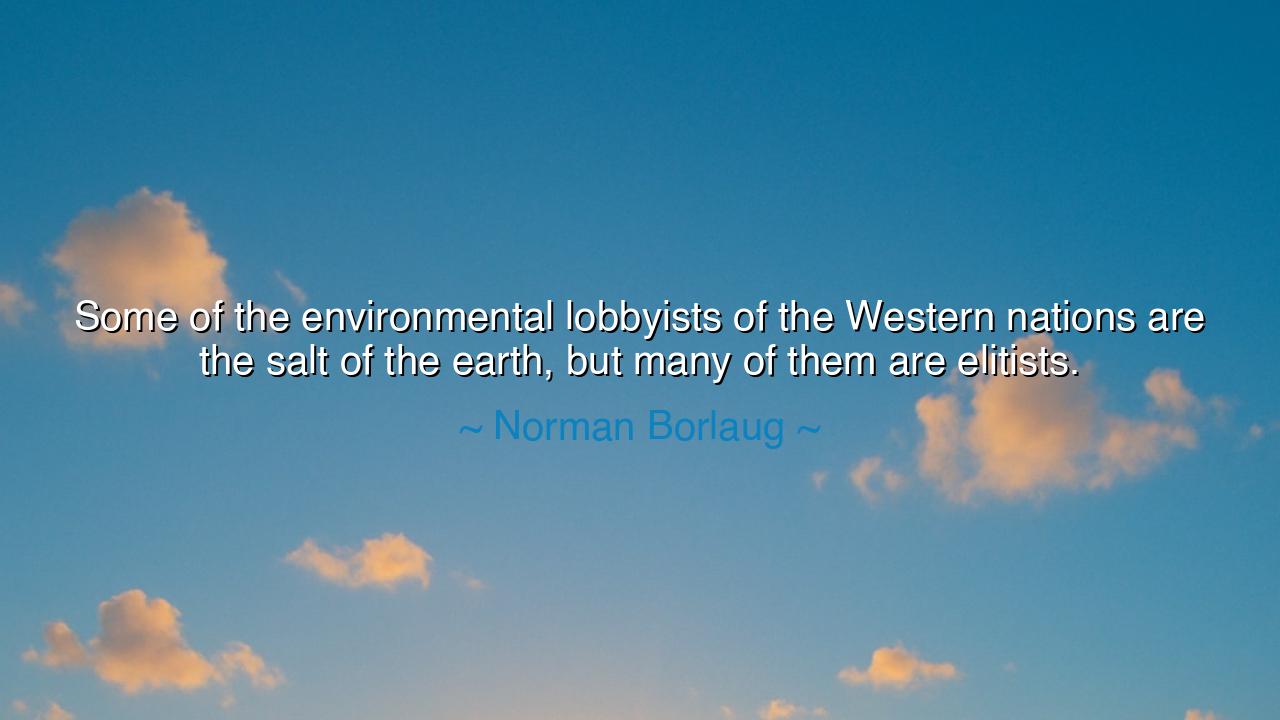
Some of the environmental lobbyists of the Western nations are
Some of the environmental lobbyists of the Western nations are the salt of the earth, but many of them are elitists.






The words of Norman Borlaug, father of the Green Revolution, carry the gravity of a man who fed the world and yet saw its divisions: “Some of the environmental lobbyists of the Western nations are the salt of the earth, but many of them are elitists.” These words, simple in form, strike like lightning against the clouds of complacency. They remind us that even within noble causes, there lies a shadow—a gap between those who fight for humanity’s survival and those who fight for prestige or ideology. Borlaug, who saved over a billion lives through his agricultural innovations, spoke not from theory, but from the soil itself. His wisdom was born in the fields, where hunger is not a debate, but a death sentence.
To call someone “the salt of the earth” is to honor their purity, humility, and dedication. Borlaug saw in some environmentalists a true reverence for the planet—a love that is practical, compassionate, and unpretentious. These were the ones who toiled in villages, who educated farmers, who sought balance between man and nature. Yet he also saw another kind: the elitists, those who spoke of saving the world from air-conditioned rooms, untouched by hunger or poverty. Their concern for the environment, though perhaps sincere, lacked understanding of the human struggle. They wished to halt technological progress in the name of purity, forgetting that millions depend on that very progress to survive. Borlaug’s words were not condemnation—they were a call to balance idealism with empathy.
Consider the story of Borlaug himself. In the 1940s and 50s, when famine haunted Asia and Latin America, he developed high-yield crops that transformed barren lands into fields of abundance. Yet many critics from the West opposed his methods, decrying them as unnatural, mechanized, or contrary to environmental ideals. But Borlaug had walked among the hungry. He had seen the faces of mothers watching their children die. To him, the choice was not between purity and pollution—it was between life and death. His rebuke of elitism was not aimed at the defense of greed or industrial excess, but at those who, from privilege, would deny the poor their chance to live with dignity.
In this, Borlaug mirrors the wisdom of the ancients who warned against imbalance. The philosopher Lao Tzu spoke of the “middle way,” where neither indulgence nor deprivation leads to truth. Likewise, Borlaug reminds us that the path to sustainability must also be the path of compassion. To protect the earth without protecting the people upon it is to worship the temple while neglecting its priests. True environmental stewardship is not born of arrogance, but of service—it listens before it preaches, learns before it judges, and uplifts before it condemns.
There is also a deeper warning in his words. When causes become symbols of superiority, when movements forget the very people they claim to serve, they lose their soul. The elitist believes they know best for all, yet the earth belongs equally to the peasant and the professor, to the villager and the minister. A humble heart does more for the planet than a proud one, for it sees the unity of all life, not the hierarchy of ideals. The “salt of the earth” gives flavor to existence through work, not words; through example, not accusation.
The lesson, then, is clear: do not let your ideals float above the world—let them take root in it. Help the farmer before you scorn his tools. Understand the fisherman before you ban his nets. True progress is forged by those who stand in the mud and still see the stars. Borlaug’s wisdom calls us to action that is both compassionate and grounded, visionary yet human.
So let every generation remember: the earth does not need saviors cloaked in pride; it needs servants clothed in humility. If we would heal the world, we must first touch it—not with speeches, but with hands that labor, hearts that listen, and minds that seek balance between growth and preservation. For only when love for nature and love for humanity walk hand in hand will our stewardship be worthy of the soil beneath our feet.






AAdministratorAdministrator
Welcome, honored guests. Please leave a comment, we will respond soon